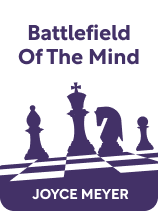

This article is an excerpt from the Shortform book guide to "Battlefield of the Mind" by Joyce Meyer. Shortform has the world's best summaries and analyses of books you should be reading.
Like this article? Sign up for a free trial here .
Where does spiritual doubt come from, and where can it lead? What’s the difference between doubt and unbelief?
When Jesus called Peter to walk on water, Peter did it—for a moment. According to Joyce Meyer, doubt caused Peter to sink. In Battlefield of the Mind, Meyer discusses what doubt is, how it differs from unbelief, and how we can fight both doubt and unbelief.
Read more for a concise discussion of doubts about God.
Doubts About God
Meyer explains that the devil attacks our minds by sowing seeds of doubt, which is when we believe in God but lack strong faith. Doubt can make us question our relationship with God and our ability to accomplish our goals. It can make us feel trapped between knowing what our spirit wants to do and what our rational mind believes is possible. For example, we may feel called by God to fulfill a specific purpose in life, but doubt can make us feel like we lack the ability, talent, or strength to see it through.
Meyer uses Peter walking on water to illustrate doubts about God. She says that God called Peter out of a boat and onto the water during a storm. Because he believed in Jesus, Peter got out of the boat and was able to walk on water. But when he looked around at the power of the storm and began to think rationally about what he was doing, doubt crept into his mind. As soon as he began to doubt, he sank.
Meyer uses this story to remind us that God will never give us a challenge that we cannot accomplish so long as our faith in Him is strong. Peter did the impossible until his rational mind made him question his ability. In this way, faith is our antidote to doubt—it can offer us mental and spiritual rest because it helps us reject doubt and the discomfort that comes with it.
Meyer warns that if our faith isn’t strong enough, seeds of doubt can grow deep enough that they can lead to unbelief, which is when we’re unwilling or unable to follow God’s word and therefore can’t live a positive life. Meyer suggests that scripture can be a powerful tool in combating unbelief because it contains advice, stories, and lessons that we can apply to our lives. The better we know the written word, the better we can identify passages of scripture that apply to what we’re experiencing. Meyer explains that reading or meditating on an applicable passage from scripture may be the exact tool we need to see the path out of unbelief.
| Faith and Doubt Go Hand in Hand While doubt may be painful for a believer, Christianity recognizes that it’s an important component of faith and, in fact, that there can be no true faith without doubt, for if we never encounter doubt, it may mean our spiritual life isn’t deep enough. The idea that faith and doubt go hand in hand is well established in the Christian tradition. Sixteenth-century priest St. John of the Cross is perhaps most famous for his poem Dark Night of the Soul, which describes the painful experience of a doubt so deep that it forces an emptying of the soul (which can then be refilled by faith). “Dark night of the soul” has become a colloquialism for a crisis of faith. Doubt can and does affect even the most devoted followers of God. Mother Theresa wrote letters to her spiritual advisor admitting that she had deep feelings of doubt despite her devotion to her work. In Mother Teresa: Come Be My Light: The Private Writings of The Saint of Calcutta, we see that Mother Teresa felt that the place in her soul where God belonged felt blank, leaving her with a sense of loss, darkness, and longing. While she asked that her letters be kept private, after her death, the Vatican determined that they should be made public, in part, to provide an example of how even saints (she was canonized in 2016) can experience doubt. |

———End of Preview———
Like what you just read? Read the rest of the world's best book summary and analysis of Joyce Meyer's "Battlefield of the Mind" at Shortform .
Here's what you'll find in our full Battlefield of the Mind summary :
- How the Devil makes it his mission to corrupt our minds with negative thoughts
- How to recognize the signs that Satan is attacking your mind
- How to thwart Satan’s attacks and find happiness and fulfillment






